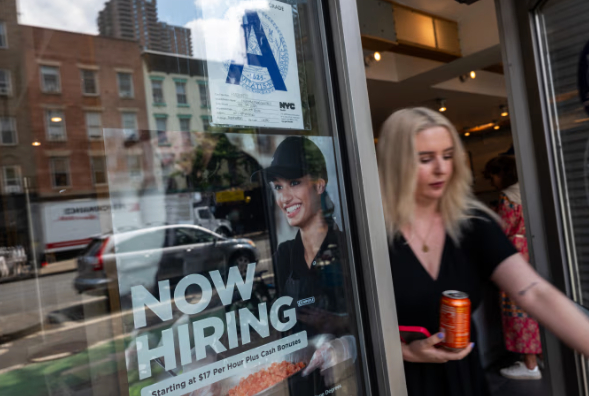
The US labor market data appears rosy: new jobs continue to grow, and the unemployment rate remains low. However, beneath this surface, countless Americans are caught in a difficult survival game—forced into part-time or suboptimal work, their incomes barely covering their living expenses, and the gap between ideals and reality continues to tear apart their career dreams.
Official US data shows significant job growth, but a closer look reveals a worrying true.net new jobs since the pandemic has only been 5.5 million far lower than the apparent figure. More importantly, part-time job growth has far outpaced full-time, with many full-time jobs being split or converted to part-time. This statistical method masks a deterioration in job quality: when people are forced to work multiple jobs to make ends meet, the official unemployment rate may remain "stable." A report from Indeed.com indicates that the surge in part-time jobs is both a strategy for employers to adapt to economic uncertainty and a sign of weakening hiring power.
Structural contradictions in the job market are becoming increasingly acute. High-paying white-collar jobs in sectors such as technology, finance, and media continue to decline, while blue-collar industries such as catering, retail, and logistics are the primary contributors to job growth. Data from the Federal Reserve Bank of New York shows that the youth underemployment rate has climbed to 40%, with many graduates forced into jobs that don't match their education. Halleck, director of the Yale University Career Center, admitted, "Students' opportunities have significantly decreased. Half of liberal arts graduates are unemployed, and science and engineering graduates are also facing dissatisfaction." Even the aura of prestigious universities can't withstand the market downturn. The unemployment rate for liberal arts graduates at Princeton University is as high as 53%.
The phenomenon of "education inversion" is becoming increasingly pronounced. Highly educated people are forced into a "makeshift" situation: recent graduates with dual degrees are unemployed, and even a 45-hour workweek with a Master of Library Science degree in Library Science still struggles to meet the median household income in New York City. A report from the Federal Reserve Bank of St. Louis shows that 50.2% of those working multiple jobs hold a four-year college degree, a 9.1 percentage point increase from pre-pandemic levels. The imbalance between educational investment and returns has led countless families to question the value of higher education.
The gap between wage increases and soaring prices has further squeezed living space. Data from the Department of Labor shows that real hourly wages for workers have only increased by 1.2% while the Consumer Price Index rose by 2.7% Credit card debt has reached a record high with household debt exceeding $18 trillion. Murray, who transitioned from working at a supermarket in a low-income neighborhood to one in an affluent area, witnessed a polarized reality: on one side, customers struggling on food stamps, and on the other, the affluent, who pay for overpriced goods. Ordinary workers are struggling to make ends meet, and a dream job has become a luxury.
To fill the income gap, more and more Americans are turning to part-time jobs and side hustles. International students use their spare time as tutors, social media assistants, or to organize clubs; local residents take on odd jobs through flexible employment platforms. These choices are both coping strategies and a reflection of the fragmented labor market. While digital platforms and remote work have provided new channels, the instability of income and the intense workload have made making do a tiring routine.
The difficulty in finding a dream job reflects deep-seated contradictions in the economy, industry, and education. As high-paying jobs shrink, wage growth stagnates, and educational investment lags behind market demand, countless Americans are forced to compromise between survival and their ideals. This wave of "making do" isn't just a cascade of individual challenges; it's also a warning sign of systemic problems. Only by confronting these structural imbalances and reshaping the connection between education and industry can more people escape the fatigue of juggling multiple roles and regain professional dignity and hope in life.

Since 2022, the Fed has cumulatively reduced its balance sheet by $2.4 trillion through quantitative tightening (QT) policies, leading to a near depletion of liquidity in the financial system.
Since 2022, the Fed has cumulatively reduced its balance sh…
On December 11 local time, the White House once again spoke…
Fiji recently launched its first green finance classificati…
Recently, the European Commission fined Musk's X platform (…
At the end of 2025, the situation in the Caribbean suddenly…
The U.S. AI industry in 2025 is witnessing a feverish feast…